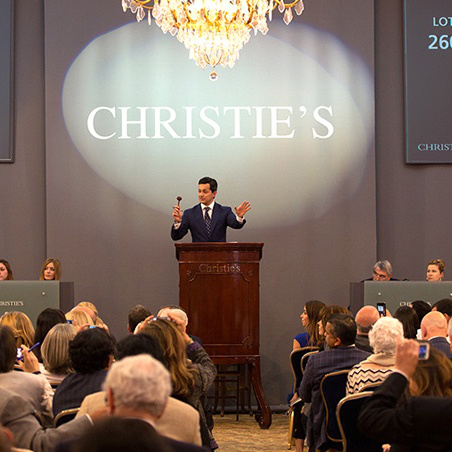The blockchain is a technological breakthrough, and its true genius lies in its simplicity. Blockchain is the world’s the first ever public, transparent, decentralized, globally-accessible, digital ledger. The concept of blockchain technology has been inextricably associated with cryptocurrencies, which use this ledger technology to run digital coin transactions. However, the applications of blockchain ledgers go far beyond the realm of financial technology.
Christie’s, the British auction house of worldwide repute, started integrating blockchain technology ledgers into its recordkeeping and management systems. This past October, the 250 year-old auction house installed a blockchain system to upgrade and modernize its auctioneering services. Christie’s Blockchain Registry has proven a resounding success, and the auction house will continue to use blockchain technology to heighten its transparency in its centuries-long trade of art and other collectibles.
Record-Breaking Art Sale Recorded on Christie’s Blockchain
On November 13th, Christies auctioned off the Barney A. Ebsworth Collection, a prized collection of twentieth-century American art. The auction attracted buyers from 23 countries and nearly $318 million in sales, but the value of the collection was not the most intriguing thing about the Ebsworth Collection. Rather, the recent auction caught the eye of insiders across the art and tech worlds alike due to the fact Christie’s recorded the auction on a blockchain-based registry. By the time the gavel fell on the last piece, the Ebsworth Collection had become the most highly-rated art auction ever to be recorded on a blockchain ledger.
The blockchain application in Christie’s auction house is referred to as ‘The Registry’ and logs all noteworthy information throughout the process of artwork sales such as sales, final prices, auction dates, item titles, restoration and ownership transfers or thefts. The only information not stored on the blockchain registry is the information of the owners, which is an intentional measure meant to protect the privacy of art collectors and investors.
Art-focused technology provider Artory, had officially partnered up with Christie’s auction house, and the two entities handled the revolutionary art auction in tandem. Artory used its own blockchain technology to host the auction information and register Christie’s artwork sales. Christie’s Registry recorded the auction of the 42 pieces auctioned off in the Ebsworth Collection, while Artory’s private Enthereum-powered Dapp recorded all the noteworthy details of the sale.
Blockchain Tech Finds New Use in the International Art Trade
Utilizing blockchain technology as a registry recording key pieces of data about important transactions provides prospective buyers with the opportunity to participate in international art trading without fear. Theft, forgery, vandalism, and similar threats pose major challenges to doing business in the art world, and blockchain tech offers an elegant solution to these challenges. Blockchain’s natural transparency provides security and an immutable virtual record of the entire transaction history. This means every time a piece of artwork is transferred, a digital certificate is generated, providing a better buyer guarantee and allowing the auction house to ensure they are selling only original artwork.
Blockchain technology may have gotten its start in finance, but it’s finding applicable use cases across the economy. From lawmakers and the court system to scientists, universities, and artists, blockchain ledgers are popping up everywhere. Blockchain technology can find use in any field that involving the secure collection, recording, and transfer of data – which in today’s digital economy, covers just about every common commercial activity. Regardless of the fate the cryptocurrency markets may have before them, blockchain technology is a major technological innovation that will have impacts across the global economy.

